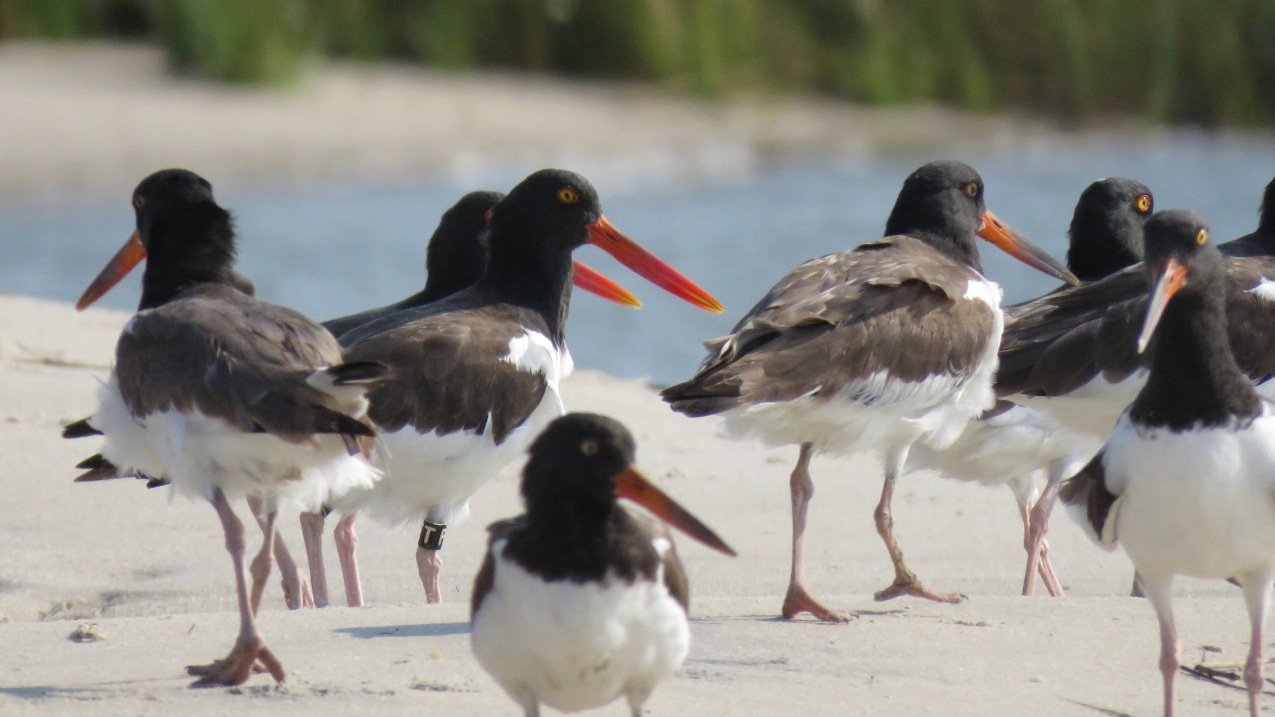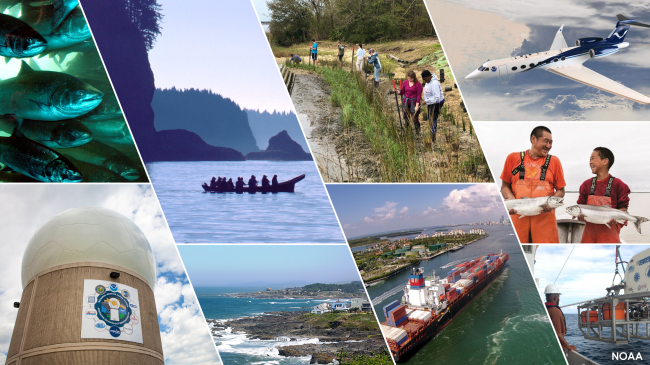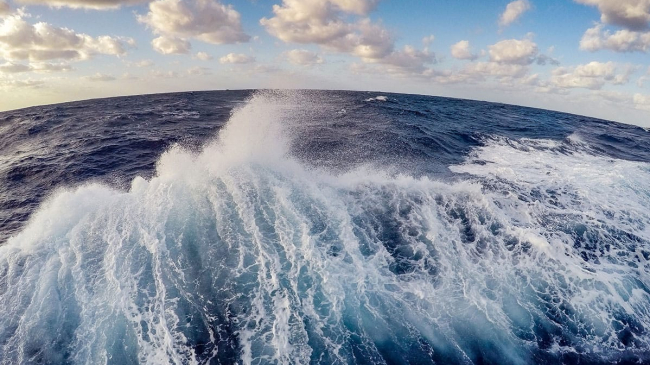Grants will benefit 31 coastal states and U.S. territories, increase future resilience and support important fish and wildlife habitat

A flock of oystercatchers on Skidmore Island, part of Eastern Shore of Virginia National Wildlife Refuge. (Image credit: USFWS)
Today, NOAA and the National Fish and Wildlife Foundation (NFWF) announced $144 million in new grants to support natural infrastructure projects in 31 coastal states and U.S. territories. These grants will support design and implementation of projects to enhance the resilience of coastal communities and improve habitat for fish and wildlife across the U.S. The 109 grants announced today will generate more than $97 million in matching contributions for a total conservation impact of $242 million.
The grants were awarded through the National Coastal Resilience Fund offsite link (NCRF), a partnership between NOAA, NFWF offsite link, the Department of Defense (DOD), Shell USA, offsite link TransRe offsite link, SalesForce offsite link and Oxy offsite link. The NCRF supports capacity building and larger-scale planning, design and implementation projects to help improve community and coastal habitat resilience and reduce risks and devastating impacts of rising seas, coastal flooding and more intense storms.
Funding for this year’s grants includes $144 million for 109 projects provided through the Bipartisan Infrastructure Law, Congressional appropriations and private partnerships. These grants are in addition to the 27 projects totaling $44.7 million announced in October offsite link funded through the Inflation Reduction Act.
“NOAA is proud to work with NFWF and partners to help communities be ready and resilient to climate change,” said Rick Spinrad, Ph.D., NOAA administrator. “Funding from the Bipartisan Infrastructure Law will help bolster community resilience efforts and meet the demand we’re seeing for projects that address coastal hazards and enhance ecosystems that are important for wildlife, communities and the coastal economy.”
“This year’s grant slate continues our significant investments in nature-based solutions that are critical to increasing the resilience of vulnerable communities and protecting and restoring essential habitats for fish and wildlife,” said Jeff Trandahl, executive director and CEO of NFWF. “The NCRF supports the development and implementation of sustainable designs, plans and practices that integrate natural features into successful coastal resilience outcomes and that promote adaptation and resilience to storms, floods and other coastal hazards.”
The natural infrastructure projects supported by the NCRF not only buffer communities from more intense storms, they also provide vital habitat for fish and wildlife species. The projects supported by the 109 grants announced today will restore and create important coastal habitats, including salt marshes in New England and restored tidal wetlands in California, and will help Alaskan coastal communities prepare for a changing climate.
“The National Coastal Resilience Fund (NCRF) presents a unique opportunity for the Department of Defense (DOD) to partner with non-governmental organizations and state and local governments to invest in climate resilience projects that reduce our installations' and defense communities’ risks from storms, floods and other coastal hazards. Through the 2023 NCRF, the DOD Readiness and Environmental Protection Integration (REPI) Program will invest $15 million to support the planning, design or implementation of 11 coastal resilience projects,” said Brendan Owens, Assistant Secretary of Defense for Energy, Installations, and Environment. “We’re thrilled to provide over $5.5 million toward two projects in Hawaiʻi that promote healthy and resilient coastal areas and watersheds for communities that rely on them, including the Hilo Bay Watershed on Hawaiʻi Island and the Heʻeia National Estuarine Research Reserve on Oʻahu. Investing in these collaborative efforts with partners demonstrates the Department’s commitment to solutions that advance installation and climate resilience across the country.”
The NCRF uses a “pipeline” approach for funding all stages of project development, including planning, design and implementation. The 109 projects announced today will support efforts of grantees across all stages of the pipeline, including 17 grants to support ongoing NCRF-funded projects that will help these communities advance to the next stage in developing a “restoration-ready” resilience project.
“Through our partnership with NFWF we are taking meaningful action to protect shorelines, wildlife and communities the places where our people live and work,” said Colette Hirstius, Shell’s Senior Vice President, Gulf of Mexico. “Shell’s business relies on a vibrant, resilient working coast and we are proud of the work the NCRF’s investments will do to help reduce the vulnerability of coastal communities, protect shorelines, wildlife and communities most vulnerable to a changing climate.”
“TransRe is pleased to continue our support of NFWF’s efforts and the good they do for the environment and for the coastal communities they assist,” said Brett Denyer, TransRe’s Head of Sustainability and Resilience. “Since 2018, NCRF has funded various successful projects that have helped restore natural infrastructure with stronger and better protection and has demonstrated that nature-based solutions can be effective.”
"Oxy believes in the power of partnerships to drive positive change. We're thrilled to collaborate with the National Fish and Wildlife Foundation and the National Oceanic and Atmospheric Administration on their grants to benefit coastal communities, which provide a unique opportunity to combine environmental preservation with community resilience," said Karen Sinard, Oxy Vice President, Environmental and Sustainability. "Together, we can create a sustainable legacy for generations to come."
NFWF launched the NCRF in 2018 at Congress’s direction, in partnership with NOAA and joined initially by Shell and TransRe. This program supports on-the-ground projects to engage communities and reduce their vulnerability to growing risks from extreme weather, rising sea levels, flooding and other coastal hazards through strengthening coastal ecosystems that benefit both people and wildlife.
A list of the 2023 grants made through the National Coastal Resilience Fund in November offsite link is available online.
Media contacts
Kate Silverstein, NOAA, (202) 603-9651, katherine.silverstein@noaa.gov
Rob Blumenthal, NFWF, (202) 857-0166, rob.blumenthal@nfwf.org



